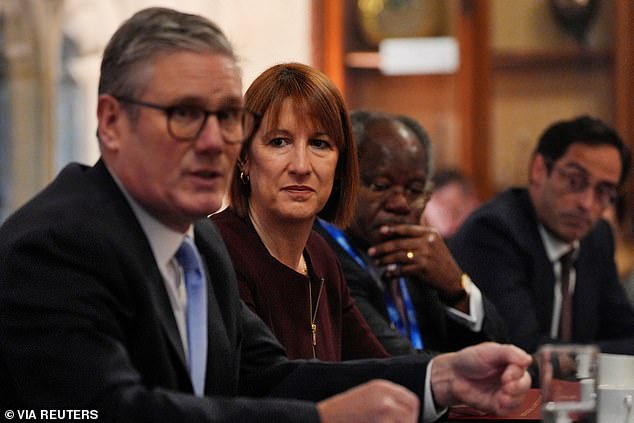If the Labour Party is good at one thing, it is tolerating weak and ineffective leaders.
As an MP and former transport minister during the final days of New Labour, I couldn’t believe that Gordon Brown had been allowed to remain in charge so long.
Like many of my colleagues in the party, I knew that if Brown led us into the 2010 election, it would spell the end of everything we’d spent more than a decade working towards. And, sure enough, it did – with David Cameron marching in to No 10.
Yet Labour didn’t learn.
In 2015, my erstwhile party elected Jeremy Corbyn as leader: a role he clung on to for five lamentable years.
Now Labour are in power – and, to my shame and horror, they’re at it again.
If his first ten months in office have taught us anything, it is that Keir Starmer simply isn’t up to the job of being party leader – let alone Prime Minister.
The country is in profoundly poor shape with the economy on its knees and the borders as porous as ever.

Labour MP Tom Harris with former primer minister Tony Blair
The governing party is imploding, with senior MPs warning me privately that Starmer has lost the confidence of vast swathes of the parliamentary cohort after unpopular benefits cuts.
With his party polling at just 21 per cent, the writing is on the wall for the beleaguered former lawyer. Some are born to lead, others to serve. Starmer, for all his naked ambition, is one of the latter.
And, for Labour, the future looks bleak indeed.
When I joined Labour as an idealistic 20-year-old in Ayrshire, I had seen first-hand the devastating poverty and civil unrest that, whatever benefits they brought elsewhere in the country, Margaret Thatcher’s reforms had wreaked on my home town.
I believed Labour truly represented the working class.
Forty years on, I am appalled at how my party has changed. The self-inflicted crisis engulfing Starmer’s administration risks not only turfing him out of office but leaving Labour out of power for a generation or longer.
That may sound extraordinary for a government elected on a ‘loveless landslide’ less than a year ago, but these are uniquely febrile times.
As I saw myself with Gordon Brown, no politician wants to give up the top job. But I firmly believe that Starmer has to go – and go now. Not just for the good of his party, but the health of our nation.
After all, Starmer is entirely to blame for this mess thanks to his poor politics and even poorer judgment.
We see these, firstly, with immigration – perhaps the biggest issue for the British electorate. Starmer appeared to recognise that during the election campaign last year, pledging to ‘smash the gangs’ of people-smugglers and stem illegal migration.
Yet, since taking power, he has shelved the Rwanda plan – still the best option on the table, as Donald Trump’s reported enthusiasm for it shows – and failed to provide anything approaching an effective alternative to its clear deterrent effect.
Meanwhile, small boat crossings have hit new record highs – with more than 11,000 arrivals in just the first four months of this year.
No wonder the party’s already paying the price.

Chancellor Rachel Reeves’s floundering crackdown on non-doms is clearly proving a direct impediment to her own alleged ‘growth’ agenda, says Mr Harris

Keir Starmer is entirely to blame for this mess thanks to his poor politics and even poorer judgment. Now, for Labour, the future looks bleak indeed, he adds
Last week, Reform – in my view, essentially a single-issue protest party on immigration – swept to multiple victories at the expense of both Labour and the Tories.
Not only did Labour lose 198 local councillors, but it also surrendered the symbolically significant Runcorn and Helsby seat by just six votes to Nigel Farage’s upstart party. Considering Labour won the constituency in July with a 14,700-vote majority, the swing is almost unprecedented.
And yet, alarming as this should be, senior Labour figures are still refusing to see sense. On Sunday, former transport secretary Louise Haigh argued that the way to beat Reform was, bizarrely, to hike taxes even further.
What utter nonsense. Voters are visibly furious at Starmer’s total unwillingness to get a grip on immigration – and that includes the party’s traditional working-class base.
Now, as the Financial Times reported yesterday, once-loyal trade union members are turning to Reform – comically epitomised by Reform’s deputy leader Richard Tice posing last month in the Commons in a ‘Save Our Steel’ trade union badge.
I don’t believe for a second that Reform has the interests of working people at heart. But, as Louise Haigh’s ill-thought intervention suggests, Labour clearly doesn’t, either.
If you were wondering who the party is actually for now, the answer is obvious – the chattering classes of north London literary salons.
Yet Labour’s problems run deeper still. When I was an MP in the early 2000s, I remember Tony Blair and then-chancellor Gordon Brown seriously considering levying taxes on ‘non-doms’ as well as making cuts to the winter fuel allowance. But they did what sensible politicians do. They ran the numbers and realised that neither policy would materially affect the Exchequer, however much attacking non-doms might delight the far-Left of the party.
Fast forward 20 years and Starmer is ploughing on with both these avaricious, economically deranged schemes.
His cuts in winter fuel allowance have haemorrhaged support for his government, while Chancellor Rachel Reeves’s floundering crackdown on non-doms – which analysts have admitted could cost the Treasury as much as £12billion – is clearly proving a direct impediment to her own alleged ‘growth’ agenda. Likewise, her rise in capital gains tax is now expected to leave her with a £23billion black hole.
And then there’s the small matter of the European Union. I led the campaign for Brexit in my native Scotland so, naturally, I was pleased with the outcome of the 2016 referendum. Even most reasonable Remainers now appreciate the best thing for the country is to accept Brexit and make the best of it.
Indeed, Starmer previously promised to accept the people’s wishes, should he ever rise to power. However, as soon as he stepped over the threshold in Downing Street, he got on the phone to Brussels. His covert ‘Rejoin’ agenda will supposedly come to fruition on May 19 at a ‘reset summit’ between the UK and the EU.
Starmer is understood to be hoping for much closer ties with Brussels – notably on trade and security.
Whatever his protestations, as the man who openly backed a second referendum as Corbyn’s Brexit spokesman in 2019, this is clearly a step back into the Brussels sphere of influence.
If the Prime Minister thinks repairing our tattered social fabric means re-opening the EU question, he’s even more incompetent than I thought.
In many ways, Starmer has become a victim of circumstance. He limped into No10 last July with a colossal majority courtesy of Tory incompetence rather than Labour excellence – receiving the lowest vote share of any Prime Minister since the Second World War. He wasn’t popular when he walked into No 10. And he’s even more unpopular now. He has to go.
The only question that remains is who should succeed him. While I hold no personal ill-will towards Rachel Reeves, her position will be untenable should Starmer step down. Not only has she courted controversy thanks to the exaggerations on her CV, but her blighted record in No 11 is too tightly bound to Starmer’s.
To my mind, the obvious choice is Health Secretary Wes Streeting, who tells people what they need to hear rather than what they want.
Despite his own past involvement with the pro-trans charity Stonewall, Streeting has vocally backed the Supreme Court ruling that trans women are not women.
He’s also been admirably honest about the need for the private sector within the NHS – a fact that lesser politicians would have shied away from.
Regardless, Starmer’s days are numbered – and the truth is that I suspect he knows it too.
- Tom Harris was parliamentary under-secretary of state at the Department for Transport from 2006-08












